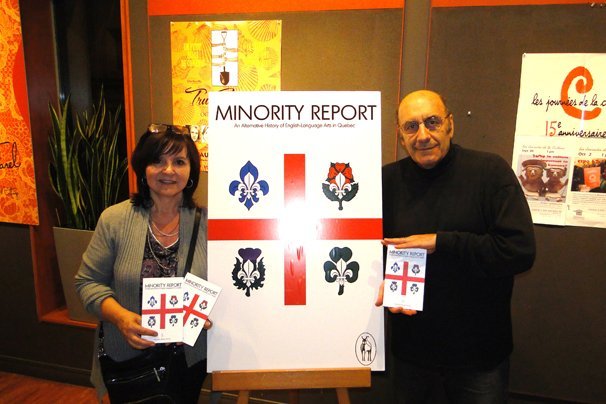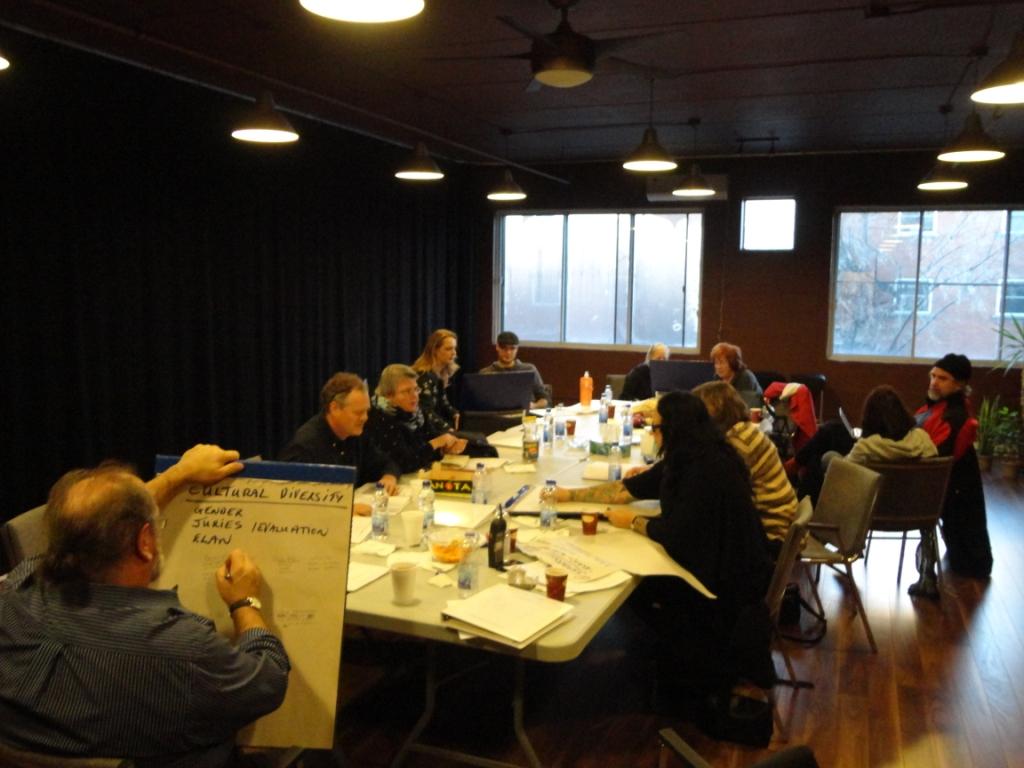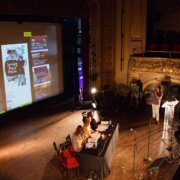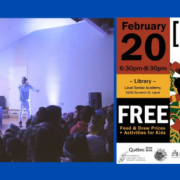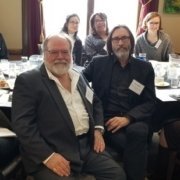ELAN History Series: 2011
Marking Milestones in Montreal
When le Conseil des arts de Montréal (CAM) published a history of its first fifty years in 2009, there was a glaring lack of recognition for English-language arts, despite important contributions from institutions like Centaur Theatre and Black Theatre Workshop and artists like Ranee Lee, Margie Gillis, David Solway, Johanna Skibsrud, and Daniel Barrow.
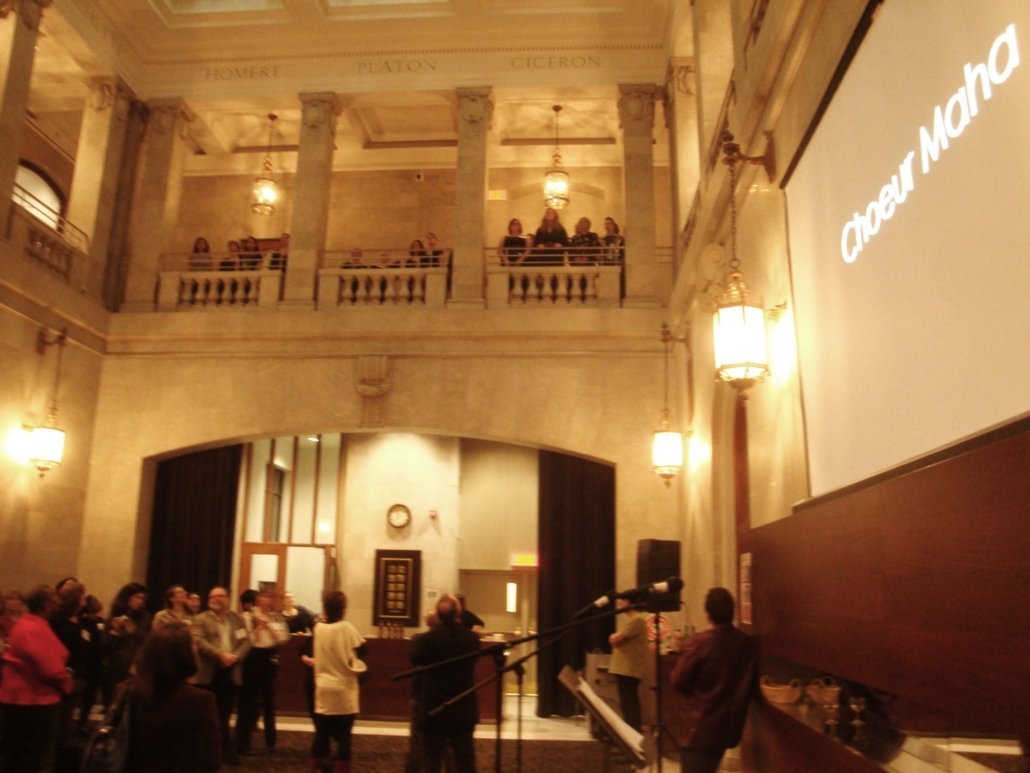
Milestones celebration in Atrium of the Conseil des arts de Montréal.
Photo by Guy Rodgers
The Marking Milestones event was created when ELAN became aware that many organizations were celebrating significant anniversaries in 2011. Executive Director Guy Rodgers proposed to CAM that they should host a celebration to duly recognize the organizations that contributed to the reputation of the city of Montreal as a creative, cosmopolitan centre.
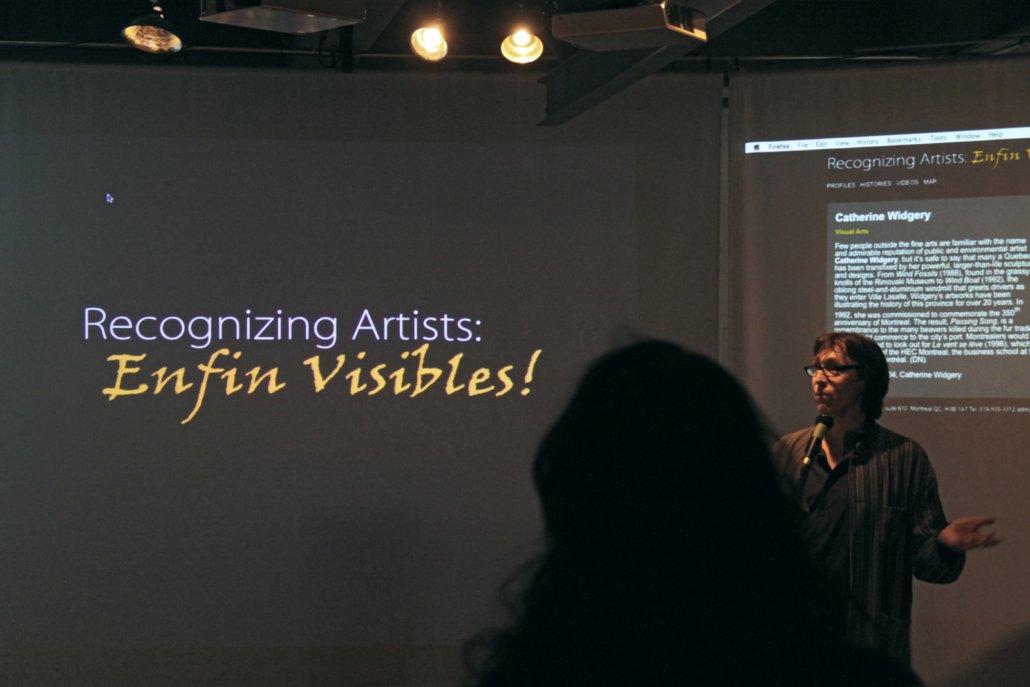
Guy Rodgers speaking at the launch of Recognizing Artists: Enfin Visibles in 2010.
Photo by: Michael Reinhart
ELAN’s Recognizing Artists: Enfin Visibles! (RAEV) project, launched in 2010, also contributed greatly to elevating the profile of high-calibre artists and arts organizations working in Quebec. ELAN marked the completion of the RAEV project in 2011 with the addition of video clips, interactive maps and never-before-told stories about Quebec’s English-speaking cultural scene.
State of the Arts: Phase 2
Despite the unexpected funding cuts from Minister of Canadian Heritage James Moore, ELAN hosted the second phase of the State of the Arts project in 2011 with great success. The State of the Arts conference, “Creative Solutions for a Creative Community”, featured representatives from both English and French speaking arts communities in Quebec, discussing issues from the creative economy, to campus and community broadcast media, to building capacity through mentorship, funding and studio space.
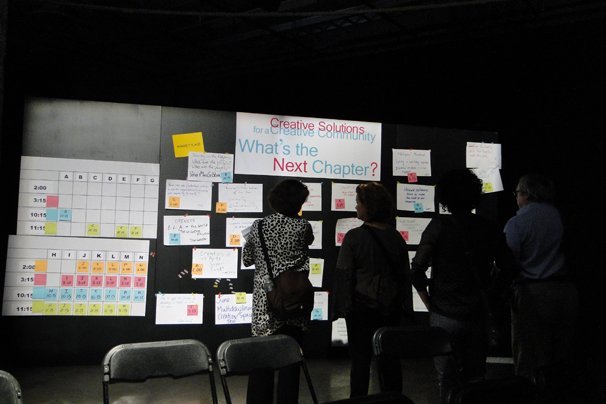
State of the Arts conference held at the Société des arts technologiques [SAT] – Creative Solutions Board
Photo by: Guy Rodgers
The conference addressed the complex interdependency of issues like the relationship between arts and culture with urban planning in regions like the Eastern Townships, Wakefield, St. Camille, or how the arts can contribute to youth retention in rural areas. Many of the issues raised are still relevant today, including municipal and zoning regulations placing constrictions on venues, studios and rehearsal spaces, or the cycle of gentrification that often feeds off the commercial and cultural capital that working artists bring to their neighbourhoods.
And yet, as Victoria Lessard reported in The McGill Daily, the SotA discussions touched on the perennial issue of “the possibility of a “backlash” by Quebec art funding programs against English artists out of fear for the deterioration of French culture, and the public image of the English artist among the French community”. This was a familiar issue that ELAN recognized through previous years’ research, where English-speaking artists were sometimes hesitant to openly identify with the minority language community in Quebec. The State of the Arts discussions, however, never failed to emphasize the importance of collaborating with French-speaking colleagues and institutions on programming, establishing shared artistic spaces, and developing common resources.
The cuts to project funding meant that several showcases and artistic events planned for 2011 had to be cancelled, with the exception of one. State of the Arts culminated with a special bilingual presentation of The Season: a Musical by Socalled, at Theatre Outremont in collaboration with Pop Montreal.
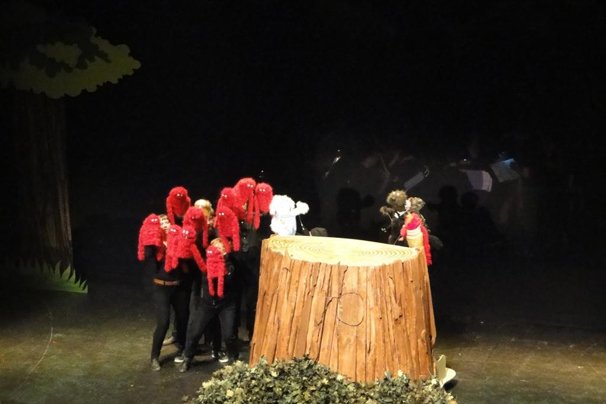
World premiere of ‘The Season’ a musical by So-Called at the Outremont Theatre.
Co-produced by ELAN and POP Montreal for State of the Arts.
Photo by: Guy Rodgers
Arts and Community Culture On The Road (ACCORD)
ACCORD (Arts and Community Culture On The Road) Phase I was about making connections with artists and regional associations. The first year of the ACCORD project intended to develop relationships with regional communities across Quebec and give them workshops to build sustainable capacity so they could continue to produce or host artistic events. As demonstrated in the surveys conducted in previous years, “[t]hese regions have been looking for ways and means to provide cultural events and exchanges with their communities for a long time, and finally the ability to provide solid research and data has been achieved”.
At the time, ELAN also hosted workshops funded by le Conseil des arts de Montréal (CAM): writing with Dimitri Nasrallah and Julie Barlow; visual arts with Nadia Myre and Max Wyse; theatre with Johana Nutter and Paul Van Dyck; music with Paul Cargnello and Katie Moore. Portfolio Days workshops for visual artists to exhibit their works to the public were held over two days, enabled by new funding and a growing relationship with CAM. The second phase of ACCORD, in 2012, would build on this research through a robust public program that included workshops, a touring program to English-speaking communities all around Quebec, and the launch of a website.
Minority Report: An Alternative History of English-Language Arts in Quebec
In 2011, ELAN published Minority Report: An Alternative History of English-Language Arts in Quebec with Guernica Publishers, edited by Dimitri Nasrallah (who later became fiction editor for the Esplanade Books imprint at Véhicule Press). The collection of essays featured an introduction by Guy Rodgers and chapters by Marianne Ackerman (theatre), Tao Fei (dance), Melora Koepke (film), Lori Callaghan (visual arts), and Lucinda Catchlove (music). The histories featured in the book were first published, in English and French, on the RAEV project website along with videos and profiles.
“Quebec’s English-language arts have experienced a remarkable revival in the 21st century. The music scene has attracted international attention. Arcade Fire’s Grammy award for Album of the Year in 2011 even drew political attention. The National Assembly voted unanimously to recognize the role played by Quebec’s artists – Francophone and Anglophone – as ambassadors on the world stage. Quebec’s English-speaking community is also producing award-winning writers, film-makers, visual artists, dancers and theatre performers.”
Launch of Minority Report: An Alternative History of English-Language Arts in Quebec at Centaur Theatre Lobby. Publishers from Guernica Editions: Connie Guzzo McParland and Michael Mirolla.
Photo by: Guy Rodgers
Continued Advocacy and CRTC Presentations
Signalling the growing recognition of the importance of English-language arts within Montreal’s cultural community, ELAN was encouraged in 2011 by Culture Montréal (CM) to have a representative stand and be elected to the CM board. ELAN’s Executive Director Guy Rodgers was ultimately elected for the CM board, serving for four years, and was later replaced by Fortner Anderson.
Culture Montréal first discovered ELAN in 2007, when ELAN made an intervention about municipal art policy. Simon Brault, then-President of Culture Montréal and Anne-Marie Jean, then-Executive Director, were trying to make connections with English-speaking artists and cultural workers in Quebec.
Meanwhile, ELAN continued to make representations to the CRTC concerning license renewals and broadcast policy.
“The central issue for Anglophones in Quebec is not language per se. English-language programming is not absent from Quebec airwaves. However, the glut of content emanating from the United States, and even English Canada, does not strengthen our communities; it undermines local identity and attachment, and threatens the vitality of Quebec’s OLMCs. This threat is, of course, further amplified when the strength of external voices is paired with the silence of local ones.”
Excerpt from ELAN Advocacy Letter to CRTC.
Among these interventions was Imagining a Broadcast and Media Strategy, a report informed by interviews conducted by Fortner Anderson and Mahalia Verna, and situated at the intersection of community and industry concerns. The report summarized issues that ELAN had been lobbying for several years, regarding the lack of locally-produced English-speaking media content and representation.
The recommendations put forth by the Imagining Media Strategy report included creating an English-language community television channel, a network of radio content, and a shared distribution platform for English-language content. These interventions were crucial in contributing to additional funding for English-speaking Québécois production.
ELAN board strategic planning session – at Playwrights’ Workshop Montreal space. Left to right: Chuck Childs, Peter MacGibbon, Vicki Marcok, Bettina Forget, Atif Siddiqi (staff), Shelagh Plunkett, Lucy Ravinsky, Ian Ferrier, Kate Wisdom, and Julie Keller.
Photo by: Guy Rodgers
Click here to “flip through” our 2011 Facebook album!


